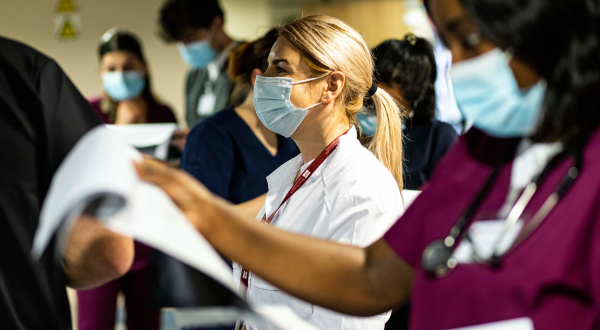International cooperation partners praise RSU METC project ‘Simulated hospital: pre-hospital placement for medical students’
In June and July this year, the Medical Education Technology Centre at Rīga Stradiņš University (RSU METC) hosted a pre-hospital placement in a simulated hospital environment. From 2 to 13 June, third-year international Medicine students took part, followed by Latvian students from 2 to 8 July, who participated in this type of study process for the first time.
The simulated hospital is one of the RSU METC’s training formats, offering students the opportunity to practice clinical care skills in conditions that closely resemble a real hospital environment, yet are safe and controlled.
International cooperation and development of local practice
For the fourth consecutive year, at the end of the semester, the RSU METC premises were transformed into a simulated hospital for international students, complete with patient wards, nursing stations, and procedure rooms. As in previous years, during the June placement students had the opportunity to develop their technical skills while working with patients – both actors and mannequins – under the supervision of experienced mentors.
This year, the placement was particularly special as it was observed by international cooperation partners – representatives from Metropolia University of Applied Sciences in Finland and the TOKASA bilingual programme: Hanna Lenkola, Senior Lecturer; Alexis Mbeutcha, Lecturer in Nursing; Suvi Korhonen, Finnish Language Lecturer; and Sari Haapio, HyMy-Village Project Coordinator. The aim of their visit was to provide a comprehensive overview of the implementation of the simulated hospital placement – from layout planning and setting up the training environment, to organising practical classes, attracting mentors, and assessing students.
The Finnish colleagues actively participated in the training simulations and praised the work of METC. Hanna Lenkola, Senior Lecturer and Head of the TOKASA bilingual programme, remarked: ‘The environment was surprisingly realistic, providing students with the opportunity to gain practical experience in clinical care skills, communication with patients, and patient education. I was also really impressed by the creativity and technical skills of the RSU METC engineers – this kind of interdisciplinary collaboration between medicine and engineering is truly unique.
It is evident that the simulated hospital at METC is the result of several years of dedicated work, facilitated by the forward-thinking and continuously improving mindset of the faculty.’

From left to right: Madara Blumberga, Head of Simulation-Based Education Development at METC, and representatives of the TOKASA team – Hanna Lenkola, Sari Haapio, Alexis Mbeutcha, and Suvi Korhonen.
In turn, the METC team had the opportunity to learn more about the approach implemented by the TOKASA bilingual programme – the integration of language learning into professional education, which allows international students to study nursing and Finnish simultaneously to a level that enables successful integration into the local healthcare system after graduation. Although the methods differ in format, both the simulated hospital and the TOKASA project clearly highlight a shared goal: to make education more closely aligned with the real world, more inclusive, and more relevant to the needs of the labour market.
Taking into consideration the accrued long-term experience and the positive feedback from international students, this year, for the first time, medical students studying in Latvian also had the opportunity to undergo the simulated hospital placement. The training concept, its structure, and set-up were identical to the June placement; however, this was a completely new experience for the Latvian students. Over the course of a week, students tackled complex situations, practised their clinical care skills, worked in teams, applied their theoretical knowledge, and developed non-technical skills such as communicating with patients, setting work priorities, calculating medicine doses, and identifying patients.
At the Department of Internal Diseases, students encountered patients with heart conditions, tumours, and progressive illnesses requiring palliative care. The Surgery Department included both acute cases such as renal failure and pancreatitis, as well as scheduled patients with lipomas, hernias, or referrals for gallbladder removal. All simulation scenarios were carefully designed to represent a broad spectrum of real-life situations and to test the students’ readiness for actual hospital work.
Simulated hospital – platform for growth and cooperation
In the placements held in June and July, students not only strengthened their professional skills but also gained a deeper understanding of the daily rhythm of a hospital, the importance of teamwork, and the consequences of their decisions. At the same time, the simulated hospital became a platform for cooperation among METC employees – a place where ideas, experience, and a shared vision for the future of medical education come together.
Every year, professionals from various fields – nurses, teachers, engineers, laboratory assistants, instructors, and administrative staff – come together to create an authentic and high-quality training environment. The simulated hospital is not merely a method; it is an experience that stays with students, shaping the values of future doctors, their attitudes towards patients and colleagues, and strengthening their professional competences.
Related news
 Learning from mistakes – RSU Faculty of Medicine launches reporting system to improve patient safety in clinical placementsAktualitātes
Learning from mistakes – RSU Faculty of Medicine launches reporting system to improve patient safety in clinical placementsAktualitātes




